Sun 30 Aug 2020
A Movie Review by David Vineyard: A HOUSE IS NOT A HOME (1964).
Posted by Steve under Films: Drama/Romance , Reviews[21] Comments
A HOUSE IS NOT A HOME. Embassy Pictures, 1964. Shelly Winters, Robert Taylor, Cesar Romero, Ralph Taeger, Kaye Ballard, Broderick Crawford, Mickey Shaugnessy, Jessie White, Lisa Seagram, Benny Rubin, Mari Welles, Tom deAndrea, Edy Williams, Connie Gilchrist, J. Pat O’Malley, Hayden Rorke, Roger C. Carmel. Screenplay by Russell Rouse & Charles Greene, based on the autobiography of Polly Adler. Directed by Russell Rouse.
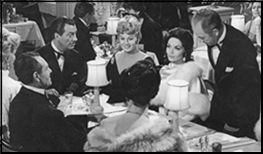
A House is Not a Home, and in this case it isn’t much of a movie either.
Supposed to be frank and shocking this is mostly tired and trite, unless you are deeply shocked by someone shouting the word “whore†on screen, or by the fact men pay for sex there is nothing much in this that wouldn’t be perfectly at home with the board of censors.
Better movies had been much racier and more frank in this same period without once having to scream the word “whore,†out loud or repeatedly (and in a tour de force of bad overacting).
Polish immigrant Polly Adler (Shelly Winters) is poor and innocent (and Winters at this point in the film is a parody of the kind of part she played so well in A Place in the Sun, actually painful to watch), narrating her fall and rise and moral fall in Adler’s own self serving “what’s a girl to do†style.
After getting in trouble with a guy she is rescued by good guy Bootlegger Frank Costigan (Robert Taylor) a mobster with ties in government and crime who aides Polly in her becoming a famous madam with rich clients and lady like prostitutes who dress well and behave, mostly.
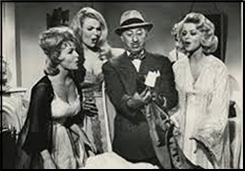
Innocent Polly just wakes up a madam one day with absolutely no clue how it happened.
Meanwhile still nice Polly meets bandleader Casey (Ralph Taeger) who she falls tragically in love with much to her later regret.
No attempt is made to use period costume or clothes, and the sets are few and far between. It might as well be 1964 in most scenes, and this television instead of a movie.
Mickey Shaughnessy is a crooked cop “Backdoor Reardon†(and no, not one person involved in the film seems to have gotten just how hilarious that is in this context); Broderick Crawford a crooked cop; Cesar Romero Lucky Luciano; Lisa Seagram a prostitute with a drug problem; Roger C. Carmel a drug addicted horn player, Hayden Rorke a crooked lawyer becoming Luciano’s private judge; Kaye Ballard young Polly’s pal in a sweat shop; J. Pat O’Malley a police inspector; and so on.
In short a blend of old familiar faces and “and then I slept with†film bio.
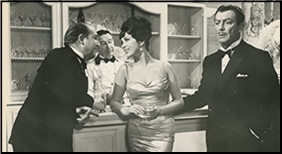
Gee, that’s profound. I think most of us figured that out around puberty, but it is nice to know the world’s most famous madam picked up on it. The Happy Hooker, Polly ain’t. By this movie, save for being raped early on, you could draw the conclusion that Polly herself is a virgin, just a poor little golden-hearted darling picked on by all the mean gangsters, politicians, and policemen wanting a cut of the pound of flesh she carves out of her girls lives.
The screenplay is a paean to Dick and Jane level dialogue, so pretentious and self serving not a single word sounds as if it had ever passed the lips of an actual living human in the real world. Polly’s ghost writer sounds as if he read The Old Curiosity Shop and Fanny Hill over and over to get the tone he wanted.
Attractive Meri Welles suicide is a highlight/lowlight a moment of overacting by an an under-talent that could end any career. The writing, staging, and Winters hysterics will have you on the floor laughing. The proper reaction is “throw another one in the river and see if they float.â€
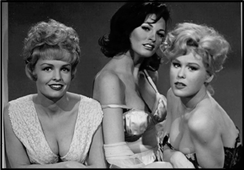
You have to show people as human before their fate means anything even in a movie this bad. Welles sudden New Year’s depression and leap from a balcony is staged like a high school production of the balcony scene from Romeo and Juliet, without context and telegraphed so broadly Marconi could read it from his grave.
Bad movies come and go, this one mostly went, except it had one thing going for it, seems a couple of young songwriters tackled the title song, and when their names were Hal David and Burt Bacharach, the result was far better than anything in the film. “And a house is not a home, unless love is there..†may not be Cole Porter, but it blows anything in this film away.
No one really gets a career boost from this. Taylor sleepwalks, Winters keeps trying to act as if this was a real movie. Romero tries hard not to be noticed. Everyone else just does their schtick, though Shaugnessy could be prosecuted for mugging in the first degree.
“You’ve been a madam, you sold flesh. They haven’t made a soap that can wash that away,†Polly is told by Frank (Robert Taylor) who actually opens his eyes to deliver this gem.
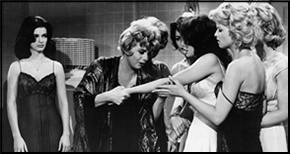
Polly tries desperately to escape her fate when Casey proposes, but Frank’s words ring too true. What is a poor girl to do, but write a bestseller and have something to retire on.
Apparently Polly read one too many Cornell Woolrich novels without having learned the point about fate so she madly dances as gangster Frank looks on trapped like a poor canary in her life of sin … “she’s only a bird in a golden cage …â€
And though she would be good again, this is the exact point Winters career became a satire, a parody of what she was at her best.
As a general rule it should be noted something about the idea of whorehouses brings out the worst in everyone involved in a Hollywood drama. They work well enough in comedy, but get serious and you can wade knee deep in the angst and overacting.
Do yourself a favor, listen to the title song over the credits and then quickly turn to something else. It is only the only defense against this film.

August 30th, 2020 at 6:22 pm
One famous actress played one of “Polly’s Girls” in this film, and her name is not listed in the credits at the top of the review. She’s in one of the photos I added, perhaps two. Can you spot her?
August 30th, 2020 at 6:59 pm
Noting here that the partnership of Clarence Greene and Russell Rouse followed this up two years later with the now-legendary The Oscar – and that’s definitely another story …
August 30th, 2020 at 8:18 pm
From Wikipedia: “THE OSCAR also marked the near-endpoint of Clarence Greene and Russell Rouse’s careers; they made just one more feature afterwards: 1967’s THE CAPER OF THE GOLDEN BULLS…”
That the movie was a huge flop didn’t seem to make a dent in co-screenwriter Harlan Ellison’s career, but the fact remains it was the only feature film he ever wrote, or co-wrote.
August 30th, 2020 at 7:01 pm
Other than Welles and Seagram the only one I noticed was Russ Meyer’s wife Edy Williams. The film does list “Polly’s Girls” in the opening credits very quickly, but I didn’t see all of them in the IMDB extended credits.
August 30th, 2020 at 8:14 pm
Edy Williams, yes, she was in the movie as well, but she’s not who I was referring to. I’m not sure I would recognize her, so if Miss Williams is in any of the photos, I’d like to know.
August 30th, 2020 at 7:05 pm
There is an exception to the “rule” about whorehouses in drama, but the most obvious one involves an Oscar winning performance in ELMER GANTRY by Shirley Jones, who went on to play a comic turn as a madam in CHEYENNE SOCIAL CLUB.
I like WALK ON THE WILD SIDE, but Barbara Stanwyck, a favorite of mine, chews considerable scenery in it as a Lesbian madam in love with Caupucine.
August 30th, 2020 at 7:10 pm
Alive and appreciably more attractive than Shelley Winters, who makes me shudder. This girl, makes me stand up and salute, as I would even in prehistoric times.
August 30th, 2020 at 8:11 pm
Right on, Barry!
August 30th, 2020 at 8:27 pm
The credits for Polly’s Girls are on the screen long enough in the video I embedded to make out all of their names.
It was her very first screen credit.
August 30th, 2020 at 9:57 pm
And lest we forget, a double STAR TREK tie-in with Carmel and Michael Forest.
August 30th, 2020 at 10:39 pm
Not in the same episode, were they?
August 30th, 2020 at 9:58 pm
Edy Williams is the busty brunette in the middle of the cleavage trio above unless I’ve forgotten her.
August 30th, 2020 at 10:07 pm
Is that Karen Black on the right in the trio picture?
August 30th, 2020 at 10:27 pm
I don’t believe so, but I went to IMDb to check on her, and if it is, they don’t know about it. While I was there, I glanced through her credits, both movies and TV. Over 200 of them. I wonder if there’s anyone who might have seen them all?
August 30th, 2020 at 10:28 pm
PS. IMDb might be wrong.
August 30th, 2020 at 10:11 pm
Sorry, obviously that’s RW. Edy is a blonde in this one, the center girl in the photo of Polly’s Girls in the credits. She has a bit in the film where two gamblers at a casino measure her bosom and remark she is a 39 (you’d think they would know in a film full of women sizes are always given as even numbers, 32, 34, 36, 38, 40 until you get past 50 in order to accommodate cup sizes — I know, the things you learn on here).
August 30th, 2020 at 10:31 pm
Well, women’s bosoms themselves don’t come in two inch increments,do they?
August 31st, 2020 at 6:46 am
Fun review, and what I would have said – take the song (Dionne Warwick version) and dump the rest of it.
Correct spelling is Hayden Rorke, by the way, remembered as Col. Bellows in I Dream of Jeannie.
Making her screen debut as Call Girl: Raquel Welch.
August 31st, 2020 at 10:29 am
Rorke it is, and I’ve fixed it. Thanks, Jeff!
August 31st, 2020 at 1:27 pm
Glad to see that you corrected Hayden Rorke.
But …
You know, I boldfaced Clarence Greene for a reason.
Who in Heck is “Charles Greenwood”, anyway?
August 31st, 2020 at 1:40 pm
Mike
Still struggling to get my eyes in focus again. That’s my only excuse. These reading glasses from CVS just aren’t cutting it. I get my new prescription in ten days. Can’t wait.
PS. Thanks!!